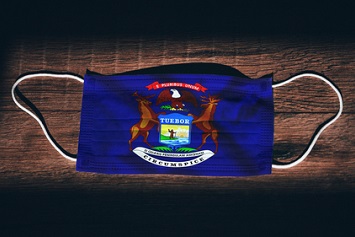The Michigan Occupational Safety and Health Administration (MIOSHA) issued emergency regulations for coronavirus disease 2019 (COVID-19) exposures in the workplace. The regulations include a requirement for remote work, when feasible. Michigan becomes the second state, following Virginia, to issue emergency COVID-19 regulations.
COVID-19 is a respiratory disease caused by the SARS-CoV-2 virus.
MIOSHA’s regulations include employer requirements for preparedness and response plans, infection prevention measures, health surveillance, workplace controls, personal protective equipment (PPE), recordkeeping, and training. In addition to requirements for all Michigan employers, the regulations also contain specific requirements for the following industries:
- Casinos;
- Construction;
- Health care;
- In-home and personal care services;
- Manufacturing;
- Meat and poultry processing;
- Public accommodations and libraries, museums, restaurants and bars, and retail establishments; and
- Sports and exercise facilities.
Employers in the state first must perform exposure assessments, evaluating routine and reasonably anticipated employee procedures and tasks for potential employee exposure to the SARS-CoV-2 virus. Employers then must categorize job procedures and tasks into lower, medium, high, or very high exposure risk categories. Workers with a very high risk for exposure include healthcare and diagnostic laboratory personnel and morgue workers performing autopsies.
Employers then must develop and implement written COVID-19 preparedness and response plans consistent with guidelines from the Centers for Disease Control and Prevention (CDC). Plans must include the exposure assessments along with measures intended to prevent employee exposures. Measures covered by the plans should include engineering and administrative controls, basic infection prevention measures, health surveillance, PPE, and training.
Infection prevention measures required under the emergency regulations include:
- Promoting frequent and thorough hand-washing or the use of alcohol-based hand sanitizers or hand towelettes;
- Requiring that sick employees not report to work or requiring them to work in an isolated location;
- Prohibiting employees from using other employees’ desks, offices, phones, or other equipment and tools;
- Providing EPA-approved cleaners or disinfectants and increasing facility cleaning and disinfection in accordance with CDC guidance and manufacturers’ instructions; and
- Creating a policy prohibiting in-person work for employees whose work activities can feasibly be completed remotely.
Employers also must designate at least one COVID-19 safety coordinator to implement, monitor, and report on the preparedness and response plan and infection control measures. Employers must place posters in the workplace encouraging sick employees to stay home and explaining hand hygiene and cough and sneeze etiquette. They also must provide non-medical-grade face coverings to employees at no cost to them and require wearing face coverings when employees cannot maintain 6 feet of separation from others in the workplace, as well as during in-person meetings and in restrooms and hallways.
Employers must provide PPE, including respirators, to employees performing higher-risk procedures and tasks. PPE should conform to current guidance from the CDC and federal Occupational Safety and Health Administration (OSHA).
The health surveillance requirement includes a daily self-screening protocol for all employees and contractors. Employers that learn an employee, a contractor, or a visitor has an active case of COVID-19 must immediately report it to their local health department and notify all coworkers, contractors, or suppliers who may have come into contact with the person.
Employers must provide employee training on COVID-19 and SARS-CoV-2 and infection control practices and proper use of PPE. Employers must maintain records of employee training, required notifications, and screening protocols.
The Michigan emergency rules became effective October 14 and remain in effect for 6 months.
There is no federal rule for COVID-19 or airborne transmissible diseases (ATDs). California has an ATD standard that applies to healthcare facilities, correctional facilities, and certain public services.

